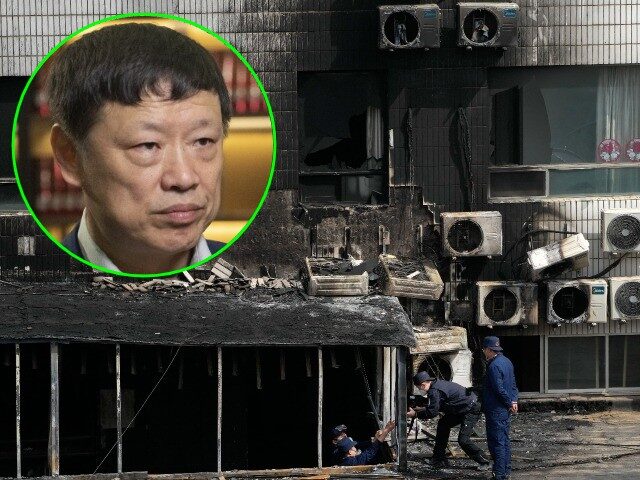A top Chinese government propagandist, former Global Times editor Hu Xijin, lamented the censorship of a deadly fire at a Beijing hospital this week, then rapidly deleted his social media post and replaced it with an innocuous post calling for police to investigate the incident.
Hu Xijin ran the Global Times, the Chinese Communist Party’s most belligerent English-language propaganda newspaper, as editor-in-chief before abruptly “retiring” in late 2021.
At the time, his newspaper had taken the lead in responding to the outrage surrounding the disappearance of tennis champion Peng Shuai, who had accused a top Communist Party official of rape and vanished from the public eye. The Global Times published staged videos of her allegedly dining in public that exacerbated global disgust and preceded the Women’s Tennis Association (WTA) announcing it would no longer host tournaments in China (the WTA ended the boycott this month).
Hu remains on the staff of the Global Times as a commentator, publishing a video series titled “Hu Says.” His latest commentary condemns American law enforcement authorities for shutting down an illegal Chinese police station used to repress political dissidents in New York City.
Hu’s recent censorship — or self-censorship — followed news surfacing of a fire at Beijing’s ChangFeng hospital on Tuesday afternoon. Information about the fire, including shocking videos of patients climbing out of hospital windows to avoid burning to death, began circulating on the Chinese state-controlled social media site Weibo on Tuesday, but users found that censors rapidly deleted the videos.
Chinese state media outlets also did not report on the incident, and Weibo appeared to suppress the fire as a trending topic, prompting angry comments from users who shared that they only learned about the fire from foreign media.
The Global Times finally reported on Wednesday that the fire had caused 29 deaths and counting. The fire had reportedly affected a hospital wing treating elderly in-patients, making it difficult to evacuate and escalating the casualty count. The state newspaper noted that local police held a press conference the next day explaining that they believed construction inside the hospital triggered electric sparks that set the building on fire.
Police also announced they had arrested 12 people in relation to the fire.
Prior to those updates, however, both hospital and Beijing government authorities offered little information. Radio Free Asia (RFA) reported on Wednesday that many of the relatives of the victims of the fire found out about it through foreign media or censored social media posts, and the hospital did not offer a confirmed list of the dead, so many loved ones were still not updated on the status of the patients at the time of publication.
Hu joined in the outrage on Tuesday by appearing to condemn authorities for not offering citizens updates on a breaking news story.
“There’s very little information about the fire, I don’t think this is how it should be,” Hu initially wrote on his Weibo profile, urging the Chinese government to “trust the public.” Hu deleted the post, but it remains available online through websites that track and document content on Weibo.
Following the deletion of his post, Hu published another message dryly sharing information about the fire and calling for an investigation into the alleged “private” corporation that manages the hospital.
“Such a catastrophe should indeed be vigorously contained,” Hu wrote in his revised comments.
Hu was far from the only Chinese social media user whose content about the Beijing fire abruptly disappeared this week. Voice of America noted that even ChangFeng hospital’s account posted and either deleted or had content deleted about the fire on WeChat, a separate government-controlled social media platform.
“According to online screenshots, ChangFeng hospital, where the fire happened, posted an article on WeChat less than two months ago about how the leadership and staff held a meeting and ran inspections to ensure fire safety,” the outlet reported. “The article has since been deleted.”
The Chinese government has a heightened interest in suppressing public anger regarding fires in light of the nationwide protest movement that surfaced late last year, fueled largely due to Chinese firefighters’ slow response to a fire at a large high-rise residential complex in Urumqi, East Turkistan. The building in question, located in the Uyghur region where the Communist Party is currently committing genocide, was under a coronavirus lockdown restriction that prevented firefighters from arriving at the scene promptly, resulting in deaths the public deemed unnecessary.
During the last weekend of November, thousands of people in nearly every major city in China took to the streets demanding an end to the restrictive “zero-Covid” lockdown and quarantine camp and, more generally, an end to the communist regime. Protesters held up blank signs in protest of censorship, essentially daring police to arrest them for saying nothing. The Party responded with mass arrests but also announced an end to the city-wide lockdowns of “zero-Covid,” an “optimization” of the system.

COMMENTS
Please let us know if you're having issues with commenting.